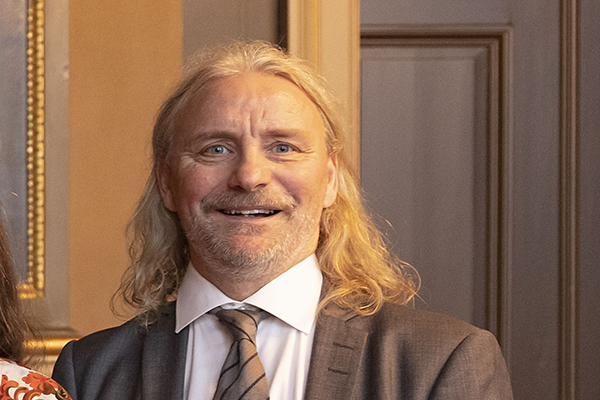This year’s Distinguished Teaching Award recipients got their awards at the University’s birthday celebrations on 7 October. One of them was Stefan Zetterström, lecturer at the Department of Law, who received this year’s Distinguished Teaching Award in the area of law and social sciences.
How was the award ceremony?
“It was really pleasant with lots of pomp and circumstance. The need for ceremonies should never be underestimated. When I stood up there on the podium, my knees did begin to quake a bit,” laughs Stefan Zetterström.
The jury’s motivation for the award is full of words about joy and enthusiasm. And in the interview, Stefan Zetterström often harks back to the importance of humour and joy.
“When I started studying law, I was very inspired by a teacher who was very joyful, positive and enthusiastic. He was also a great storyteller who could really make the topic come alive. This made it easier for students to create their own mental images.”
Joy as a driving force
He describes joy as his driving force as a teacher.
“If you’re joyful, you work better. And if things get a bit heavy, you just have to battle on and start smiling anyway. I try to use humour in my teaching and the students usually do smile in any case.”
On the question of how he can retain his enthusiasm year after year when teaching the same subject, he thinks for a moment and then starts talking about his interest in ultra triathlons. He and his partner hold the world record in Olympic distance triathlon for thirty consecutive days. This means that for thirty days, every day, they swam 1.5 km, cycled 40 km and ran 10 km. It took an average of three and a half hours per day.
“I can keep doing the same thing over and over for a long time. I can go into a kind of bubble and not be affected by what might seem boring. When I teach, I am raring to go all the way down to my toes. I shut out everything else and focus 100 per cent.”
Back to basics
Stefan Zetterström teaches right in rem in semester three of the Law Programme. He describes the importance of helping students learn how lawyers work, that there is not always a given answer, but that the important thing is how lawyers work. It’s easy for students to want to jump directly to the conclusion or want a clear yes or no to a question.
“But in law, it’s about the way you get to the conclusion. You have to be prepared to go back to what is almost banal and have patience. Just like in an ultra triathlon, you have to do the same thing over and over again, you can learn something.”
But he also says that he tries to get the students to ask all their questions. The students should feel that there are no stupid questions.
“Questions can be a good way to link the topic to other things and broaden the perspective. As a student it can be difficult to see the big picture, to get an overview.”
